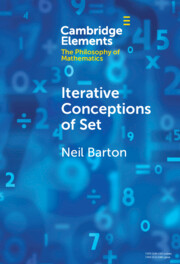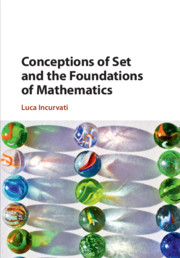Refine search
Actions for selected content:
5 results

Iterative Conceptions of Set
-
- Published online:
- 15 May 2024
- Print publication:
- 13 June 2024
-
- Element
- Export citation
3 - Challenges to the Iterative Conception
-
- Book:
- Conceptions of Set and the Foundations of Mathematics
- Published online:
- 09 January 2020
- Print publication:
- 23 January 2020, pp 70-100
-
- Chapter
- Export citation
8 - Concluding Remarks
-
- Book:
- Conceptions of Set and the Foundations of Mathematics
- Published online:
- 09 January 2020
- Print publication:
- 23 January 2020, pp 218-220
-
- Chapter
- Export citation
2 - The Iterative Conception
-
- Book:
- Conceptions of Set and the Foundations of Mathematics
- Published online:
- 09 January 2020
- Print publication:
- 23 January 2020, pp 36-69
-
- Chapter
- Export citation

Conceptions of Set and the Foundations of Mathematics
-
- Published online:
- 09 January 2020
- Print publication:
- 23 January 2020
